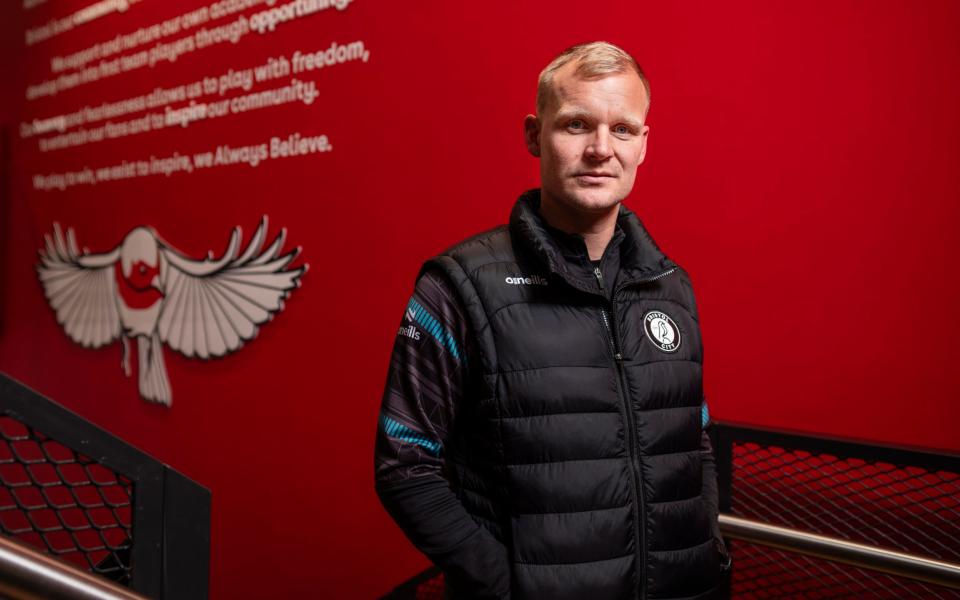Liam Manning: Nine training sessions in 60 days will not stop Bristol City taking fight to West Ham

Liam Manning is 60 days into his mission to deliver Premier League football to a south-west region starved of the top tier for 44 years.
A midwinter Championship whirlwind of back-to-back fixtures and recovery time has allowed only nine full training sessions for the Bristol City head coach. However, a nugget of non-footballing feedback raised by his players during a heart-to-heart debrief this week reassured the highly-regarded 38-year-old that the right philosophies are already hitting home.
“We were talking this morning about what we learned in December and the big things we took away,” says Manning, inviting Telegraph Sport into his office after a squad summit at the club’s training base in rural Failand, North Somerset.
The players discussed an encouraging month of three wins, two defeats and two draws, and then an immensely frustrating recent loss against Millwall. But in a frank exchange of views around bravery and priorities, the players volunteered conversations they had with families enduring real-life turmoil at Children’s Hospice South West.
“We spent some time with a host of families and we invited one of the lads who’s unfortunately not got long left to spend some time with us,” Manning explained. “It really struck me that they raised this. We’re talking about football, winning games, losing games, and that was one thing that hit quite a few of them. When you have bereavements in the family, it’s a bigger picture perspective.”
‘We’re lucky, we’re passionate, we’re obsessive’
Manning is speaking from experience, having lost his own father at 11. “I think that created the fire in the belly for me a little bit,” he says. “That was always my way of channelling it into football. And that’s always been there.
“In football, we’re lucky. We’re passionate, we’re obsessive. We’re quite selfish at times with how we have to be in the industry. Then stepping outside that bubble and having that bigger picture perspective helps when you come back in.”
For the unfamiliar, Manning’s career appears to be ahead of schedule. In November, after the relatively popular Nigel Pearson was sacked, few City fans had heard of the man being prized away from Oxford United, who were then flying high in League One. City’s mouth-watering fixture against West Ham in the FA Cup on Sunday is another reminder of Manning’s rapid rise, having been coaching the Hammers’ Under-23s just four years ago.
However, childhood grief, playing career knockbacks and work in the real world have given Manning a unique route to emerging as one of England’s most promising managers under 40. “Every challenge, every setback – you go one or two ways with it,” he said, having been released by Ipswich as a tough-tackling midfielder, aged 21. “You either fight or flight.”
‘None of it is wasted if the attitude is on the money’
For much of his 20s, every spare hour was filled working at a school, playing part-time and then securing various coaching qualifications. “I didn’t make it as a player through not being good enough,” he acknowledges. “But I got offered the academy job at Ipswich because of the values I had as a person and the behaviours I showed as a youth team player.
“None of it is wasted if the attitude is on the money. I worked as hard as I could constantly. I was really open to learning. I was fully committed in everything I did. If I didn’t show those behaviours, I don’t think I’d have been given the opportunity to go and coach in the academy.”
Manning is a graduate of the Premier League’s Elite Coach Accreditation Scheme and said he loved the “cross learning” with other sectors. He met with Google, Saatchi and Saatchi and the Lawn Tennis Association. “I like the military too – the processes, how they work, communication, clarity, and chain of command,” he said.
An openness to sharing ideas was music to the ears of City owner Steve Lansdown, the Bristolian financial services billionaire who also has control of Bristol Bears rugby and Bristol Flyers basketball teams. Manning speaks regularly with Lansdown’s son Jon, who is now City chairman, and he will be in the stands for matches later this month when the schedule is “more forgiving”.
There is a mood of quiet confidence around City, despite a mixed reaction among the fanbase to Pearson’s departure in the autumn. The club has trimmed the wage bill significantly since former chief executive Richard Gould admitted to Telegraph Sport they had been perilously close to breaching spending rules because of overspending under previous regimes. Pure profits from a talent production factory, headed up by former player and manager Brian Tinnion, has helped hugely, most recently with the £25 million sale of Alex Scott to Bournemouth.

As he settles in at Ashton Gate – a stadium now fit to grace the top division – Manning sees plenty of potential. “As well as the academy, it’s the profile of the team,” he says. “Look at someone who has not come through here like [midfielder] Jason Knight – the volume of games he’s got and the age he is at [22].
“It’s almost where we want to get to, but the way that we want to do it and the strategy of how to get there – and that is young coachable mouldable players with the right balance of experience alongside it. Having that clarity of what the club is and how we want to get there was a big attraction.”
That said, he “hopes” the club has more business to do in the January transfer window. “We’re working extremely hard to add to it but sometimes these things can be out of our hands.”
Whoever City bring in, Manning, one of many managers in favour of a mid-season break for his players, will maintain a focus on culture at the club, which he says must be talked about “before you can get to tactics”.
“When you talk about the game and the fluid state of it, it’s all underpinned by ‘can you focus for 95/100 minutes’,” he says.
The most obvious example of the model mindset is Declan Rice, who Manning coached for several years as he made the step up to the first-team at West Ham, although he is modest about his role with the England midfielder.
“A coach said to me once ‘they’re all diamonds, we just buff them up a bit along the way’,” he explained. “It’s all on the player ultimately.”
However, he said the record £105 million Arsenal signing had levels of resilience that he now preaches to his City squad. “We deal with challenges and setbacks in different ways and I think that’s definitely a problem we’re going to face even more with where the world’s at currently.”
Of his wider outlook, Manning says a “sense of entitlement” in society is one of his biggest concerns. He stays away from social media, instead relying on Chris Hogg, his straight-talking assistant who joins him everywhere, to give him honest appraisals and wife Fran to put him in his place. With such grown up perspectives, this face for the future is excited about going toe-to-toe with 60-year-old Moyes. “He’s a terrific role model for someone like myself,” Manning adds.

 Yahoo Sports
Yahoo Sports 
